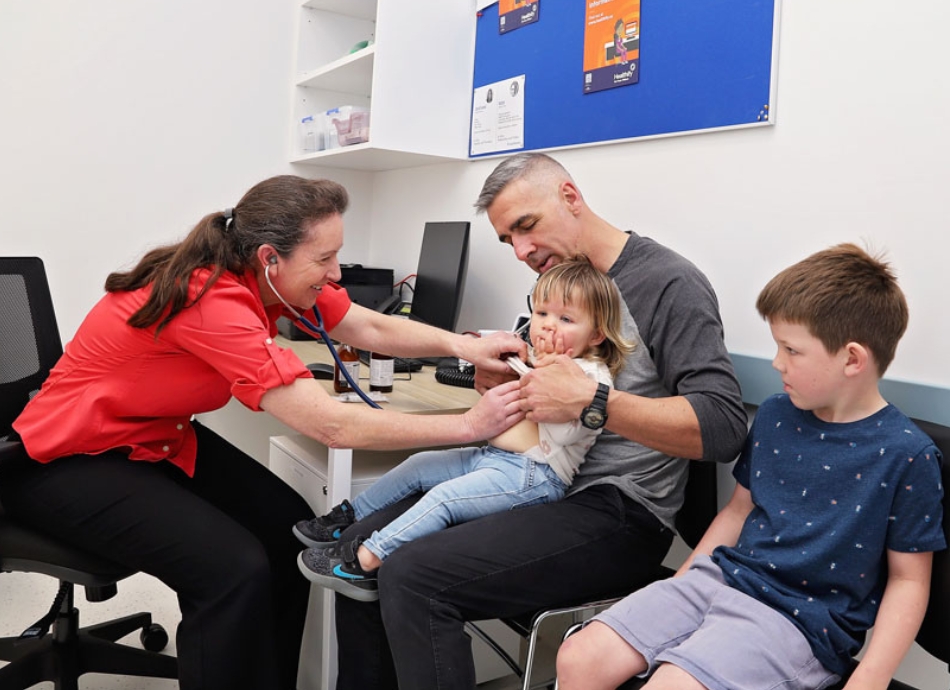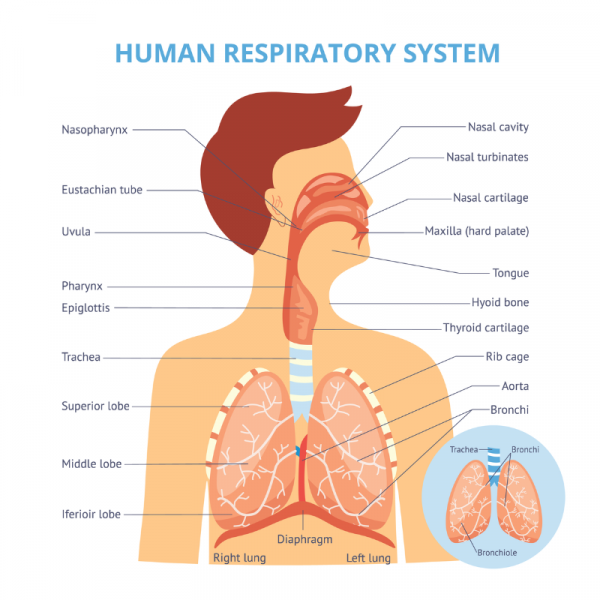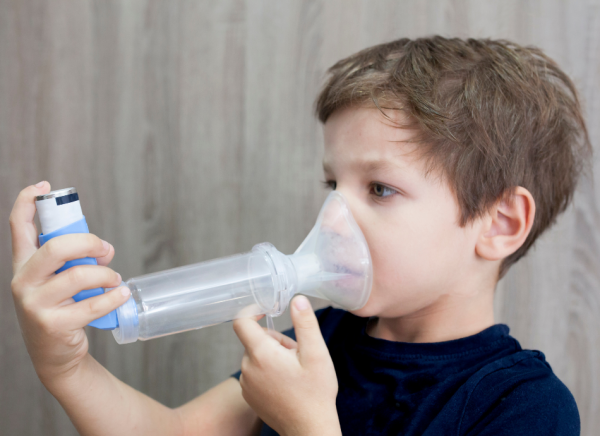You can now add Healthify as a preferred source on Google. Click here to see us when you search Google.
Wheeze in children under 5 years old
Key points about wheeze in children under 5 years old
- Wheeze is a high-pitched sound when a person breathes out and it's heard when the airways are too narrow.
- Wheeze in children aged under 5 years old is not uncommon. It doesn't always mean your child has asthma.
- The cause depends on your child's age, other symptoms and risk factors.
- Tamariki who wheeze need to be seen by their healthcare provider often to check their symptoms and response to treatment.
- About half of all children with wheeze will grow out of their symptoms by the time they start school.

Wheezing is the high-pitched whistling sound made during breathing. It is due to your airway being narrowed and can be caused by any condition that causes irritation or inflammation (swelling) of your airway – from your throat to your lungs.

Image credit: Depositphotos
When to get help
Get urgent medical help – call 111 within Aotearoa New Zealand and ask for an ambulance – if your child is:
- having severe difficulty breathing
- too breathless to talk
- floppy and very tired
- becoming less responsive
- getting blue lips and tongue
- stopping breathing
- not responding to their reliever inhaler medication.
While waiting for an ambulance follow your child's asthma action plan and use a short-acting reliever if you have one. Sit your child down and try to stay calm, give 6 puffs of reliever through a spacer, taking 6 breaths for each puff. Repeat this every 6 minutes until your child improves or until help arrives.
Wheeze in children under 5 years of age is often triggered by a viral infection.
The cause of wheeze in children depends on their age and other symptoms and risk factors, such as a family history of asthma.
Common causes include the following:
- Bronchiolitis – this is the most common cause of wheeze in children under 1 year of age. Bronchiolitis is a viral infection that affects babies' lungs. Read more about bronchiolitis.
- Viral upper respiratory tract infection or viral-induced wheeze – this is the most common cause of wheeze in children 1 to 4 years of age and happens when your child has a common cold or a chest infection. Your child is usually well in between the infections.
- Pre-school asthma – pre-school asthma can be the cause of wheeze in tamariki, especially if there is a family history of asthma or allergies. If your child has been diagnosed with pre-school asthma, it doesn't necessarily mean they'll have asthma at school age or older. Only about half of those children will. Regular appointments are needed to assess your child's asthma and treatment. Read more about asthma in children.
- Bronchiectasis – this is a chronic lung condition resulting in bacterial infections and can be the cause of wheeze if your child also has a wet-sounding cough that lasts for weeks. Read more about bronchiectasis.
- Foreign body inhalation – this usually causes wheeze that is noticed after a choking episode.
Your child most likely has asthma if the wheeze happens:
- at night or when they wake up
- during or after exercise
- when there is a trigger such as cold weather, dust, pollen, smoke, grass or certain foods
- when your child is otherwise well.
Asthma is also more likely if your child has eczema or other allergies including hay fever, or a family history of asthma or allergy.
Your healthcare provider will ask you about your child's wheeze, including how long they have been wheezing, any triggers and whether it comes and goes. They will also ask about other symptoms, such as a cough, breathing difficulties, runny nose or sore throat. Your healthcare provider should also listen to your child's lungs.
Sometimes blood tests are needed to find out the cause of the wheeze, depending on what your healthcare provider thinks is causing it. A chest X-ray is usually not needed.
In some cases, the cause of your child's wheeze may not be diagnosed straight away and the diagnosis may change over time. Asthma reliever medications, such as salbutamol used with a spacer, may be used. Asthma preventer medications may also be required for a period of time. This may then require multiple appointments to assess your child's symptoms and response to treatment.
Treatment depends on the likely cause of your child's wheeze.
Lifestyle changes
- Reduce your child's exposure to cigarette smoke and don't smoke or vape around your child.
- Keep your home warm and dry. If this is difficult to do, ask your GP or doctor if you are eligible for social support or local housing services.
- Make sure your child's vaccinations and your own vaccinations are up to date.
- Make sure everyone in your household washes their hands often to help prevent the spread of infections.
- Avoid triggers such as grass, pollen, dust or certain food if it is known to cause your child's wheeze.
Medicine
Common medicines that may be prescribed for your children include:
- salbutamol inhalers or relievers
- corticosteroids inhalers or preventers
- oral montelukast
- oral antibiotics for bacterial infections.
Always use an aerosol inhaler with a spacer. Spacers make the inhalers much more effective. Read more about spacers.

Image credit: Healthify He Puna Waiora
You will probably need to visit your healthcare provider multiple times to review your child's medicines and response to treatment, especially if your child is diagnosed with pre-school asthma. Your child may outgrow their symptoms and the diagnosis may change.
Apps reviewed by Healthify
You may find it useful to look at some asthma apps, breathing apps, and first aid and emergency apps.
About half of children will grow out of their symptoms by school age.
Asthma New Zealand(external link) provides education, training and support to individuals with asthma and their families.
Viral wheeze(external link) KidsHealth, NZ
Wheezing in children(external link) Healthy WA, Australia
Viral wheeze in children(external link) NHS, UK
Healthy home resources(external link) Asthma + Respiratory Foundation NZ
Managing your child's asthma(external link) Asthma + Respiratory Foundation NZ
Apps
Asthma apps
Breathing apps
First aid and emergency apps
References
- Is it asthma? Assessing and managing wheeze in pre-school children(external link) BPAC, NZ, 2020
- Wheezing in children(external link) Patient Info, UK, 2021
Clinical resources
Is it asthma? Assessing and managing wheeze in pre-school children(external link) BPAC, NZ, 2020
Wheezing in children(external link) Patient Info, UK
Assessing wheeze in pre-school children(external link) BPAC, NZ, 2013
Continuing professional development
Asthma in under five-year-olds(external link) Goodfellow Podcast, NZ, 2020 Dr David McNamara talks through addressing the challenges and barriers to diagnosis of asthma in the under 5-year-old child.
Credits: Healthify editorial team. Healthify is brought to you by Health Navigator Charitable Trust.
Reviewed by: Dr Roland Meyer, Specialist Physician, Respiratory and General Medicine
Last reviewed:





